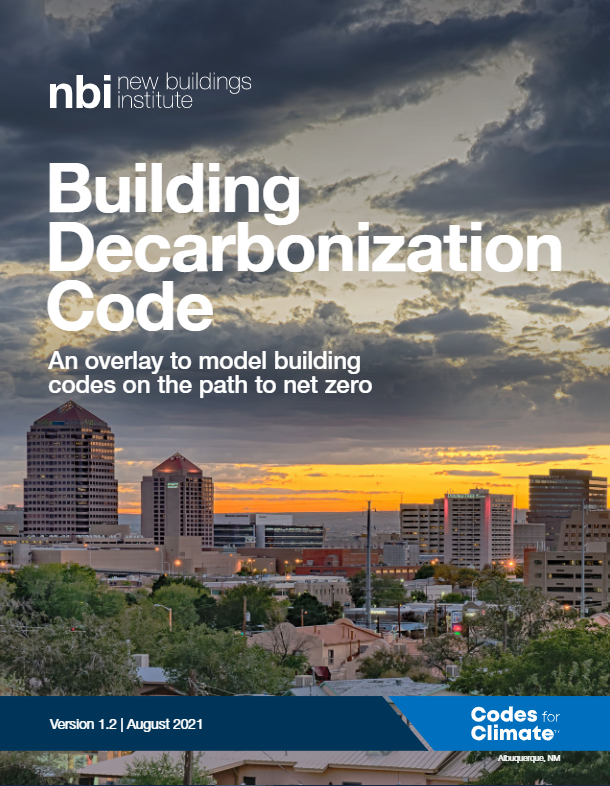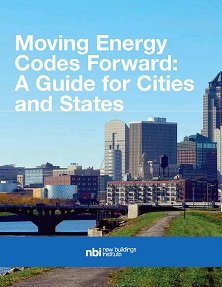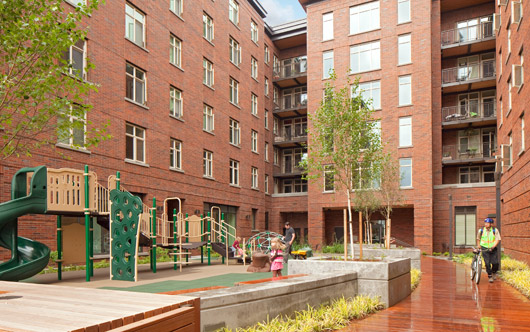Topic: Energy Codes
2024 IECC National Model Energy Code (Base Codes)
Codes & Policy / September 29, 2021 / Energy Codes
Work to update the 2024 International Energy Conservation Code (IECC) is underway. NBI submitted 50 proposals into the International Code Council’s (ICC) process to advance the 2024 IECC. The proposed amendments cover a wide range of measures and improve the...

Building Decarbonization Code
Guideline / August 26, 2021 / Energy Codes
The Building Decarbonization Code is a groundbreaking tool aiming to deliver carbon neutral performance. The Version 1.2 code language from NBI serves as a building decarbonization overlay to the 2021 International Energy Conservation Code (IECC) and is now compatible with…
Model and Base Energy Codes
Codes & Policy / July 16, 2021 / Energy Codes
For more than 20 years, NBI has been working with partners and within the code-making bodies to advance codes at the national, state, and local government levels. National model energy codes and standards like ASHRAE 90.1 and the International Energy Conservation Code (IECC) have...
2021 IECC National Model Energy Code (Base Codes)
Codes & Policy / May 15, 2020 / Energy Codes
After about a decade with few meaningful updates to the IECC, the 2021 improvements are poised to help the code catch up to modern-day building technology and practices, reducing millions of tons of carbon from entering the atmosphere while reducing...
Improved Building Energy Model Code Challenged
Post / March 12, 2020 / Energy Codes
Update: See final result Better building codes mean lower energy bills, which results in lower costs for consumers and fewer carbon emissions for the planet. Sounds like a winning combination, right? That’s why we were delighted when the initial results...
Overview of the Lighting System Requirements of the 2019 Oregon Commercial Energy Code
Webinar / November 12, 2019 / Energy Codes
The one-hour session will provide an overview of the new building lighting system requirements. The focus of this session will be on the new lighting power density requirements, a discussion on the new lighting control requirements and how to determine…
Overview of the Building Envelope Requirements of the 2019 Oregon Commercial Energy Code
Webinar / November 12, 2019 / Energy Codes
The one-hour session will provide an overview of the building envelope provisions of the OCEC including the updated building envelope R-value/U-factor requirements, continuous air barrier requirements, and other significant changes between the current OEESPC and the 2019 OCEC. Available compliance…
Overview of the Commercial Mechanical Provisions of the 2019 Oregon Commercial Energy Code
Webinar / November 11, 2019 / Energy Codes
This one-hour session will provide an overview of the HVAC requirements for typical Oregon buildings and focus the training on provisions that have a significant impact on the energy use of the building. Available compliance options will be discussed.
Votes Matter for Better Buildings
Post / October 31, 2019 / Energy Codes
Building code officials, sustainability officers, builders, efficiency advocates and others are leaving Las Vegas after attending the International Code Council’s (ICC) annual conference and public comment hearings on the 2021 International Energy Conservation Code (IECC). Updated every three years, the...
Zero Cities Project
Codes & Policy / February 13, 2019 / Energy Codes
The Zero Cities Project is a three-year project supporting both cities and their most impacted communities* to co-develop and implement actionable and equitable roadmaps and policy strategies to achieve a zero-net-carbon (ZNC) building sector by 2050. Through a community collaboration...
Stretch Codes (Advanced Codes)
Codes & Policy / October 15, 2018 / Energy Codes
New design and process strategies can be demonstrated through a variety of advanced code strategies. NBI builds market capacity for higher efficiency energy codes by encouraging the use of stretch codes (also referred to as reach codes). To support the...
Washington State Energy Code Roadmap to 2031
Codes & Policy / October 15, 2018 / Energy Codes
Many organizations and jurisdictions have adopted a range of building performance goals over the past decade that have significantly changed the conversation about energy codes and building energy performance. The primary policy driver for the Washington State Energy Code increases in...

Moving Energy Codes Forward: A Guide for Cities and States
Guideline / June 4, 2018 / Energy Codes
In cities, the building sector is a major contributor to carbon emissions and energy use accounting for up to 40% of the total energy consumed. Some jurisdictions may have climate policies and climate action plans that set targets and lay…
Zero Energy Performance Index (zEPI) and zEPI Jurisdictional Scores
Online Tool / May 16, 2018 / Energy Codes
The Zero Energy Performance Index (zEPI) provides a scale for measuring commercial building energy performance and represents a fundamental shift in measurement of building efficiency as it sets energy targets for actual energy consumption rather than using a predictive energy…
NBI’s Legacy of Code Advocacy Lives On
Post / March 8, 2018 / Energy Codes
New Buildings Institute (NBI) has played an active and influential role in building energy codes since the day its doors opened in 1997. Jeff Johnson, one of its first executive directors, was an ardent codes advocate with a long track...
Eric Makela Joins NBI’s Codes and Policy Team
Post / February 22, 2018 / Energy Codes
We are pleased to announce the addition of Eric Makela to our Codes and Policy team. He brings over 30 years of global expertise in energy code development, training and evaluation, throughout the United States as well as abroad, including...
Checking in with the Passive House Network
Post / December 7, 2017 / Energy Codes
It’s been over 25 years since the Passive House concept — tight, well designed and insulated envelope and minimized mechanical loads — was formalized in Germany, and it feels like the movement has reached a tipping point here in North...
Outcomes Matter
Post / November 16, 2017 / Energy Codes
by Ryan M. Colker, Vice President of National Institute of Building Sciences We all know what it takes to lead a healthy life—eat your vegetables, exercise, and visit your doctor to monitor your cholesterol, blood sugar, weight and blood pressure....
Model Stretch Code Provisions for a 20% Performance Improvement in New Commercial Construction
Guideline / November 6, 2017 / Energy Codes
This summary document describes a set of code strategies that represent a 20% performance improvement for commercial buildings over the ASHRAE 90.1-2013 code baseline (and approximately similar savings over the IECC 2015 baseline).
Stretch Codes: A Disruptive Solution to Super Charge Green Building
Post / November 6, 2017 / Energy Codes
This week, thousands of building industry professionals will converge at Greenbuild 2017 to share their excitement and progress advancing green buildings. While the number of green buildings—energy-efficient, zero energy, LEED and ENERGY STAR-certified, etc.—has grown dramatically over the last decade,...
A New Metric for Tracking Energy Codes Driving Toward Zero
Post / October 10, 2017 / Energy Codes
ACEEE’s 2017 State Energy Efficiency Scorecard was released in late September with Massachusetts leading based on six categories including utility programs, transportation, building energy codes, combined heat and power, state initiative and appliance standards, according to ACEEE. Looking ahead, there are...

New Multifamily Guide Offers Solutions that Deliver Up to 25% Energy Savings
Post / October 10, 2017 / Energy Codes
Multifamily buildings pose a conundrum for advancing energy performance. As a building type, they are caught somewhere between commercial buildings and single-family residences – they are often constructed like commercial buildings, yet used as residential buildings. Energy-efficient technologies and design...
The State of Technology: Outcome-Based Energy Codes and zEPI
News / August 1, 2016 / Energy Codes
This article focuses on two innovations in development over the last decade in energy codes: outcome-based energy codes and zEPI. It also features a graphic from New Buildings Institute’s “Energy Performance of LEED for New Construction Buildings”, which highlights how...
Institute Submits Outcome-Based Pathway for Inclusion in the 2018 IECC
News / April 5, 2016 / Energy Codes
Building on a multi-year, industry-wide effort to include an outcome-based pathway for energy compliance into the 2015 International Green Construction Code (IgCC), the National Institute of Building Sciences has introduced a similar proposal to be considered for inclusion in the...
